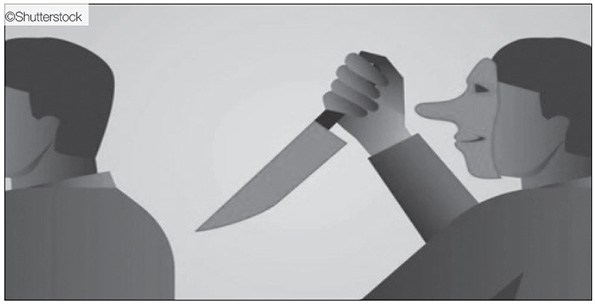
The Korean expression “Mudjima” means “do not ask why” and Mudjima crimes are frequently reported in the news. In fact, in Korean society, Mudjima crimes have been a common occurrence for a long time. Mudjima crimes are crimes which are committed against random citizens who do not know their attackers. In 2022, the police officially defined Mudjima crimes as Abnormal Motive Crimes. Let’s take a look at three cases that happened recently. The first occurred at Sillim Station, where a man in his 30s killed four people in a knife rampage. Another occurred at Seohyeon Station, where a man in his 20s crashed into a crowd on the sidewalk with his car, where he hit the pedestrians, and then killed 14 people in a knife rampage. The third was a rape and murder case in Sillim-dong Park, where a man in his 30s raped and killed a person.
The prosecution judged that the perpetrator of the Sillim Station stabbing did not have a normal motive, but was rather in a state of dissatisfaction and frustration due to the collapse of family relations and maladjustment to social life. In particular, it was analyzed that there was a great sense of inferiority toward other men of their age, and this emotion was expressed with hostility and anger. The police announced the results of the investigation commenting that the perpetrator of the Seohyeon Station incident committed the crime because he was under the delusion that a stalker group was monitoring him. In the rape and murder case in Sillim-dong Park, the perpetrator stated that he had never had sex in the past 30 years. Accordingly, CBT garnered the related contents through a phone interview with Yoon Jeong-sook, head of the Criminal Analysis and Research Division of Korean Institute of Criminology and Justice. According to her, there are three types of abnormal motive crimes. The first type is due to mental illness. The Seohyeon Station case is a typical example of abnormal motivation crime caused by mental illness. This is where the perpetrator exerts aggression on others through specific stimuli and paranoid thinking, victim delusion, auditory hallucination, and hallucination. The second type is reality dissatisfaction. This includes the Sillim Station stabbing incident where the assailant, filmed by citizens, can be seen expressing dissatisfaction with the social structure. The reality dissatisfaction type is extremely pessimistic about their situation, despair at the reality they are in, and express dissatisfaction with the overall society and reality. Finally, the third type is chronic anger, and the culprits are mainly ex-convicts. They suffer from anger management issues, and even minor stimuli may trigger their anger causing them to erupt and commit serious crimes.
Each individual abnormal motive crime differs in the type and cause, but it may be due to a social situation in which individuals become increasingly powerless in the recent era of low growth. There is always inequality in any society. No matter how much people endeavor to improve society, there are inevitably going to be underprivileged people in the social structure and others who fall behind in the competition. A small percentage of these may rationalize that these insurmountable problems have been caused by others. This is referred to as “thinking in terms of persecutory delusions,” where people tend to blame others for their problems, such as failure in human relationships or failure to find a job. All the blame is then shifted to society or politicians. It is true that as polarization intensifies in Korean society, more and more people are thinking in terms of persecutory delusions.
Yoon commented further that, “Japan has been experiencing a similar phenomenon to the current situation in Korea beginning about 20 years ago. One solution is to develop policies to promote youth independence by referring to the cases of countries that have experienced it before us, or counseling policies to solve the problem of reclusive loners.” On the other hand, after the Seohyeon Station incident, similar crime incidents have been continuously posted by the online community, raising concerns about the possibility of other copycat crimes. Yoon suggested that such speculation could in fact lead to a copycat crime, citing the fact that the perpetrator of the Sillim-dong case did an online search for Hong Kong’s Mudjima crimes before the incident. The perpetrator explored how these crimes unfolded in advance and conceived a similar crime. This is called Vicarious Learning. In addition, as the Sillim-dong and Seohyeon Station incidents overlap, people with similar psychologies may think, “Should I try to implement some crimes like these?” Other crimes can be an opportunity for people who are pessimistic about their situation, tend to seek stimulation, or have feelings of hatred toward certain classes, such as men and women of their age.
Criminologically, copycat crime is not an established concept. However, in general, it is said that it triggers people who think similar to the criminal in the case to commit a similar crime after encountering a specific criminal case, media articles that reported the incident, fictional movies and novels based on the incident. That is, such media cause triggers.
As abnormal motive crimes have continued to occur recently, the Ministry of Justice is considering establishing a strict “life sentence without parole” in the criminal law. The current law allows inmates serving life sentences to be eligible for parole after serving 20 years. According to the Ministry of Justice, the number of prisoners serving a life sentence who has been paroled from 2015 to 2022 is 119. This is considered a strict countermeasure against the crime, and an alternative to the death penalty in Korea. The “introduction of a life sentence without parole” will enter the legislative process after going through the stage of collecting public opinion from Aug. 14 to Sept. 25. The Ministry of Justice has announced that it will establish the clause in Article 42 of the Criminal Act, and added details that it will differentiate between “relative life sentence, where the perpetrator is eligible for parole after a certain period of time” or “absolute life sentence, where parole is impossible.” According to a recent poll by Gallup Korea, 87 % of the participants supported the idea of a life sentence without parole in this case. There is also a need to listen to the opinions of experts to prevent bias as severe punishment for felons is generally dominant for reasons such as protecting victims and isolating the society from felons. Experts’ apparent concerns include controversy over the effectiveness of the life sentence without parole, completely blocking the possibility of rehabilitation of criminals, and the cost of imprisoning felons for life to the taxpayer. In addition, the 49 U.S. states currently carry out life sentences without parole, but some point out that they have only increased severe punishment and correction costs, so it is questionable whether the measure will have a practical effect. In addition, it is also problematic that the government currently only doles out life sentences without parole in the case of abnormal motive crimes.
Another controversial issue is the revival of the mandatory police force. In 2017, the former government decided to abolish the mandatory police to respond to the shortage of active-duty soldiers due to the population cliff and to fulfill its pledge to create public jobs. Since 2018, the mandatory police force has been reduced by 20% every year. However, consequently the Prime Minister declared in a public statement that he would actively consider introducing a Auxiliary Police force as a security measure for the occurrence of abnormal motive crimes. The National Police Agency Commissioner also mentioned the specific scale of the introduction. Some criticized that the police tried to increase the number of police personnel by spending taxes again in a short period of time rather than restructuring existing police personnel to come up with preventative measures, and that the police tried to resolve the long-cherished project of increasing manpower under the pretext of strengthening security capabilities. However, according to a later press release by the Prime Minister’s Office, contrary to the Prime Minister’s earlier remarks, he took a step back, saying that he would consider further reinforcement after police restructuring. Upon receiving the report, President Yoon abolished the mandatory police due to a lack of military resources, and ordered the abolition of the mandatory police force, saying it would be unrealistic if the police were revived in a situation where there was a shortage of troops. According to government officials, there was confusion in communication within the government. However, Lee, the leader of the opposition party, pointed out that it revealed the incompetence of the current government and its back-and-forth administration. The government needs to consult fully on how to revive the police and avoid adding confusion to the public by approaching the policy shortsightedly.In addition, the ruling party said it plans to operate a prison dedicated to the rehabilitation of felons. Meanwhile, the Supreme Prosecutors’ Office also moved to expand financial support for crime victims. It announced “Guidelines for Economic Support for Crime Victims.” The allocated amount for counseling is limited to KRW 15 million per year and a maximum of KRW 50 million within five years, where additional support is only possible after a special resolution. During the legislative notice period, the Ministry of Justice fully considers the opinions of the two sides to find a compromise, and the government should continue to work on prevention to protect the people and the country from abnormal motive crimes in the future.
The government and related departments are looking for solutions, but simply increasing the punishment or expanding police personnel cannot be the sole and primary measure taken, as Yoon Jeong-sook, head of the Crime Analysis and Research Division, mentioned above. By properly analyzing the current social and economic situation, and by expanding the social safety net, fundamental measures should be put in place to reduce the number of people falling behind. The government must achieve these goals for a safe and desirable society.

By Kim Ye-rin
ering0325@chungbuk.ac.kr
By Seo Ah-hyun
tjdkgus666@chungbuk.ac.kr


 All
All Feature
Feature






 Kim Ye-rin
Kim Ye-rin











